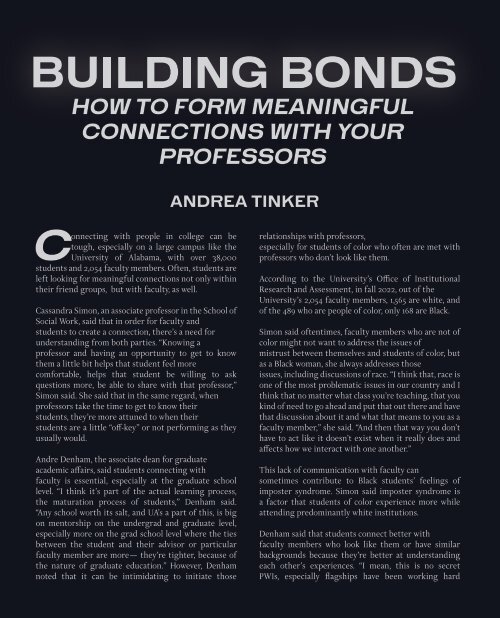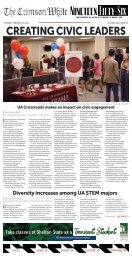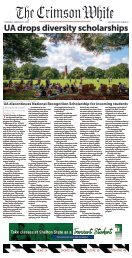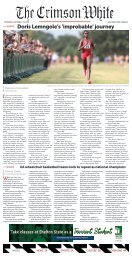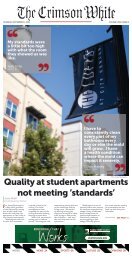Nineteen Fifty-Six Vol. 4 Issue 1
Nelson Mandela once said “Education is the most powerful weapon which you can use to change the world.” With the Fall 2023 Issue of Nineteen Fifty-Six, "Blackology" we wanted to highlight stories of Black Education from past, present and future. Focusing on the beautiful aspects of Black education but also he trials and hardships with it as well. Mostly we wanted to celebrate what it means to Black and Educated in an edition dedicated to Black educators, students and youth.
Nelson Mandela once said “Education is the most powerful weapon which you can use to change the world.” With the Fall 2023 Issue of Nineteen Fifty-Six, "Blackology" we wanted to highlight stories of Black Education from past, present and future. Focusing on the beautiful aspects of Black education but also he trials and hardships with it as well. Mostly we wanted to celebrate what it means to Black and Educated in an edition dedicated to Black educators, students and youth.
Create successful ePaper yourself
Turn your PDF publications into a flip-book with our unique Google optimized e-Paper software.
HOW TO FORM MEANINGFUL<br />
CONNECTIONS WITH YOUR<br />
PROFESSORS<br />
ANDREA TINKER<br />
Connecting with people in college can be<br />
tough, especially on a large campus like the<br />
University of Alabama, with over 38,000<br />
students and 2,054 faculty members. Often, students are<br />
left looking for meaningful connections not only within<br />
their friend groups, but with faculty, as well.<br />
Cassandra Simon, an associate professor in the School of<br />
Social Work, said that in order for faculty and<br />
students to create a connection, there’s a need for<br />
understanding from both parties. “Knowing a<br />
professor and having an opportunity to get to know<br />
them a little bit helps that student feel more<br />
comfortable, helps that student be willing to ask<br />
questions more, be able to share with that professor,”<br />
Simon said. She said that in the same regard, when<br />
professors take the time to get to know their<br />
students, they’re more attuned to when their<br />
students are a little “off-key” or not performing as they<br />
usually would.<br />
Andre Denham, the associate dean for graduate<br />
academic affairs, said students connecting with<br />
faculty is essential, especially at the graduate school<br />
level. “I think it’s part of the actual learning process,<br />
the maturation process of students,” Denham said.<br />
“Any school worth its salt, and UA’s a part of this, is big<br />
on mentorship on the undergrad and graduate level,<br />
especially more on the grad school level where the ties<br />
between the student and their advisor or particular<br />
faculty member are more— they’re tighter, because of<br />
the nature of graduate education.” However, Denham<br />
noted that it can be intimidating to initiate those<br />
relationships with professors,<br />
especially for students of color who often are met with<br />
professors who don’t look like them.<br />
According to the University’s Office of Institutional<br />
Research and Assessment, in fall 2022, out of the<br />
University’s 2,054 faculty members, 1,565 are white, and<br />
of the 489 who are people of color, only 168 are Black.<br />
Simon said oftentimes, faculty members who are not of<br />
color might not want to address the issues of<br />
mistrust between themselves and students of color, but<br />
as a Black woman, she always addresses those<br />
issues, including discussions of race. “I think that, race is<br />
one of the most problematic issues in our country and I<br />
think that no matter what class you’re teaching, that you<br />
kind of need to go ahead and put that out there and have<br />
that discussion about it and what that means to you as a<br />
faculty member,” she said. “And then that way you don’t<br />
have to act like it doesn’t exist when it really does and<br />
affects how we interact with one another.”<br />
This lack of communication with faculty can<br />
sometimes contribute to Black students’ feelings of<br />
imposter syndrome. Simon said imposter syndrome is<br />
a factor that students of color experience more while<br />
attending predominantly white institutions.<br />
Denham said that students connect better with<br />
faculty members who look like them or have similar<br />
backgrounds because they’re better at understanding<br />
each other’s experiences. “I mean, this is no secret<br />
PWIs, especially flagships have been working hard


